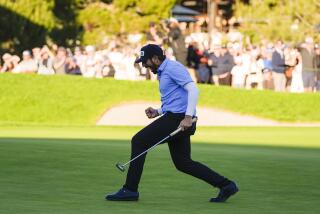Behind the Shades
- Share via
David Duval thinks a great deal of his golf game, which is why he wasn’t surprised last July when he was holding up the Claret Jug at Royal Lytham, where he had just won the British Open.
He doesn’t want it to come out wrong and he knows it sounds arrogant, but Duval says that when he finally won that first major title, he was, well, proud of himself. Because as he stood tall on one of golf’s grandest stages, he knew he was exactly where he belonged.
Duval is 30 and a far cry from the shy, pudgy kid from Florida who turned pro in 1995. This Duval is different than the younger version, because if we’ve learned anything from following Duval, it’s that he is constantly remaking himself. And you would have to say he’s done a good job.
This Duval is now the shy, thin guy from Florida who has become one of the most compelling stories in golf, almost totally by accident, mostly because he really hasn’t cared to reveal much of what’s inside him. There is this image of him, looking at the world from a safe distance, from behind his trademark wraparound shades. This could create a confusing comparison. Many people aren’t recognized when they put on shades. Duval isn’t recognized when he takes his off.
That’s not altogether true anymore. For some reason--maybe because his smiles come easier, or the after effects of winning a major championship--Duval looks and sounds more at peace with himself and the world than ever before.
It has been a long and challenging road for Duval, who sometimes got the wrong kind of feedback when he did open up and wound up getting his feelings hurt. The worst example was in 1999 before the Ryder Cup, when the issue of compensation for the U.S. players was brought up and Duval was portrayed in many circles as a greedy ingrate.
His message had been nothing of the sort. Duval had suggested that since the Ryder Cup had long grown out of its garden party image and become a moneymaking monster, the players should have some say in where the profit goes. Charities would be fine, Duval said, but that part of his answer was overlooked.
It was about the same time, the 1999 British Open at Carnoustie, when Duval was quoted making critical comments about the course. The setup was a joke, to be sure, but Duval insisted he hadn’t said so and that a British reporter taking notes of his comments had misinterpreted him. At one point, his representatives even suggested he take special training to build a better relationship with the media.
Both the Ryder Cup and Carnoustie incidents happened when Duval was No. 1 in the world, knocking Tiger Woods out of the top spot for the only time in the last five years.
What you have to understand about Duval is that he was winning just about everything in sight even while all this was going on. In 1997, he won his last three events and finished second on the money list. In 1998, he won four more times, led the money list and had the lowest scoring average on tour. And in 1999, he became the first player in 25 years to win four times before the Masters.
In the last five years, Duval has won 13 times and finished second 12 times. He has won one major and might have won three more at the Masters, where he was second in 1998 and 2001 and third in 2000.
All this has brought him fame and fortune, with more than $15 million in prize money and millions more in endorsements. If you don’t count Woods, and that’s not easy to do, Duval might be the most visible pitchman in golf equipment advertising.
And, possibly for the first time, it has also made him happy.
Of course, he did it his own way, which is the only way Duval knows. He broke up with longtime girlfriend Julie McArthur, withdrew from the Phoenix Open, didn’t play Pebble Beach or Torrey Pines and showed up at the driving range at Riviera Country Club on Tuesday, smacking golf balls until his hands hurt.
It must have worked because Duval is right there among the leaders at the Nissan Open. After rounds of 67 and 69, Duval is only three shots off the lead. That’s not bad for someone who hasn’t been on a golf course for three weeks.
Actually, not playing seems to get Duval in the proper mood to succeed. He was idle most of the off-season before the 1999 Mercedes Championships and won by nine. Because of a back injury, he took 10 weeks off after the 2000 British Open at St. Andrews and won the Buick Challenge.
Last year before the Masters, he was off five weeks because of a wrist injury, shot a 67 on Sunday and Woods beat him by two shots.
Duval says he doesn’t plan to change his ways. If he doesn’t feel fresh, he’s out of here. He says he isn’t playing to finish 30th or to make cuts or to make a few dollars. The idea is to win more tournaments, hopefully more majors. Then he can wait to see what’s written about him.
It’s not easy for Duval to admit he’s more comfortable with himself than ever and, in fact, he can’t admit it. Maybe he can do it sometime soon. He says he’s just growing up, like everybody does.
More to Read
Go beyond the scoreboard
Get the latest on L.A.'s teams in the daily Sports Report newsletter.
You may occasionally receive promotional content from the Los Angeles Times.










